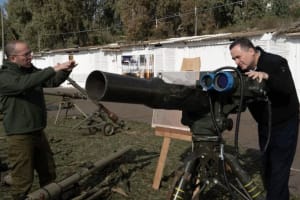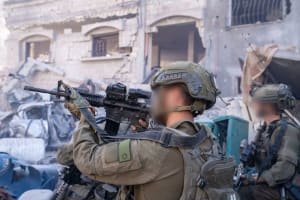Israeli army moves more troops into southern Lebanon while Hezbollah bombards Haifa with over 100 rockets
IDF eliminates head of Hezbollah's logistical headquarters while ground troops advance

Israel Defense Forces moved a fourth division into southern Lebanon on Tuesday evening, as the ground operation against Hezbollah terrorists intensified.
The Israeli Air Force (IAF) continued striking terror targets across the country, while Hezbollah fired a large number of rockets at northern Israel, marking the heaviest attack on the Haifa area since the start of the war.
Shortly after noon on Monday, the Lebanese terror group fired about 105 rockets at the city in two barrages within 40 minutes, wounding an elderly woman and causing some damage.
Earlier rocket attacks targeted Tiberias with about 25 rockets, as well as the areas of Hanita and Shlomi in the Western Galilee, Mount Meron and several other towns in northern Israel.
Lebanon: The IDF 36th Division continued clearing Hezbollah infrastructure around Maroun al Ras.
— Institute for the Study of War (@TheStudyofWar) October 8, 2024
The IDF created a fourth closed military zone in Western Galilee.
The IDF Arabic-language spokesperson called on civilians to evacuate immediately from 25 towns and villages in… https://t.co/iQ43KYjhSq pic.twitter.com/cQXSOip979
On Monday morning, the IDF announced that it moved a fourth division of troops into southern Lebanon, opening a front in the western sector along the coast. The announcement was made after the IDF issued a warning to Lebanese civilians to stay away from the sea coast and the beaches south of the Awali River, ahead of IDF operations “in the maritime sector.”
The 146th Reserve Division and its 2nd ‘Carmeli’ Infantry Brigade and 205th ‘Iron Fist’ Armored Brigade – with support from the 213th Artillery Regimen – joined three regular IDF divisions – 98th, 36th and 91st –which are already conducting operations in the central and eastern sectors of southern Lebanon.
The 91st Division and its three brigades joined the fighting on Sunday night.
כוחות אוגדת ׳המפץ׳ (146) בהן חטיבת ׳כרמלי’ (2) וחטיבת ׳אגרוף הברזל׳ (205) החלו בפעילות קרקעית ממוקדת ומתוחמת בגזרה המערבית של דרום לבנון נגד יעדים ותשתיות טרור של ארגון הטרור חיזבאללה, זאת לאחר כשנה שבה האוגדה ניהלה קרב הגנה בגבול הצפון-מערבי>> pic.twitter.com/9nMjJomokm
— צבא ההגנה לישראל (@idfonline) October 8, 2024
The military released detailed information about the capture of a Hezbollah compound by Golani Brigade soldiers, including video footage and images showing loaded rocket launchers, weapons and ammunition.
The compound overlooked Israeli towns near the border and was hidden in a private home with an adjacent olive grove.
Underground infrastructure, including foxholes and living and staging areas used by Hezbollah terrorists, were also uncovered. The compound also contained guns, anti-tank missiles, camouflage nets, combat vests and other equipment, which was destroyed.
Iranian 𝕏 user IRANIANguardian posted about the IDF's entry into the compound near Maroun al-Ras, decrying the destruction of structures there.
"The Israeli army entered Iran's garden today!" he posted in Persian. "'Hadiqah Iran' was built in 2016 at the expense of Iranian government budget in the village of Maroun al-Ras and was developed with recreational facilities for consecutive years. In this park, there were signs such as the statue of Qassem Soleimani, the statue of Khamenei, the replica of Al-Aqsa Mosque, which was destroyed by the IDF."
ارتش اسرائیل امروز وارد بوستان ایران شد!
— سرباز میهن (@IRANIANguardian) October 8, 2024
"حدیقة إیران" سال 1386 با هزینه بودجه دولتی ایران در روستای مارون الارس ساخته شد و سال های متوالی با امکانات تفریحی توسعه یافت.
در این پارک علائمی نظیر مجسمه قاسم سلیمانی، تندیس خامنه ای، ماکت مسجد الاقصی وجود داشت که توسط IDF تخریب شد pic.twitter.com/yONWziaUuE
The site was famous for a large statue of former Quds Force Commander Qassem Soleimani, who was depicted pointing towards Israel.
Earlier on Monday morning, the IDF announced it had eliminated Hezbollah’s head of its logistical headquarters, Suhail Hussein Husseini, in a targeted strike in Beirut on Sunday.
The south Lebanese village of Baraachit has seen a spike in Hezbollah military activity in recent months. In Baraachit alone, IDF airstrikes hit a Hezbollah air defense unit building in July, neutralized two Hezbollah field commanders operating there in August, and destroyed… pic.twitter.com/ZZl2dTdjwN
— Israel-Alma (@Israel_Alma_org) October 8, 2024
Husseini was a low-profile but crucially important Hezbollah commander and a member of its high command. He was in charge of the staff of the terror group’s logistical headquarters and was responsible for things related to the budget and organization of its various units.
“Husseini was a partner in the arms transfer agreements between Iran and Hezbollah and responsible for the distribution of the smuggled arms between the various units in Hezbollah, both in terms of transport and in the allocation of resources. In addition, he was a member of the Jihad Council, Hezbollah’s senior military forum,” the IDF stated.
“The headquarters also contains Hezbollah's research and development unit, a unit engaged in the production of precision missiles, and in the logistical field of storing and transporting weapons within Lebanon. By virtue of his position, Husseini was involved in the budgeting and logistical management of the organization's most sensitive projects, including the operative plan for war and other special plans,” the army added.
Husseini's death has further weakened Hezbollah's leadership, following the elimination of its leader Hassan Nasrallah and his designated successor, Hashem Safi al-Din, in Israeli airstrikes.
A Lebanese military source told A-Sharq Al-Awsat that Hezbollah is holding off on officially confirming Safi al-Din's death until his body has been recovered from the underground command center where he was killed last week.
For now, Nasrallah's nominal deputy, Naim Qassem, is representing the group in public.
On Tuesday, Qassem gave his second public speech since Nasrallah's death. He claimed that Hezbollah's forces had been eagerly awaiting Israel's ground advance and had repelled it, while also signaling readiness to take part in ceasefire talks.
However, Qassem admitted that the Israeli strikes across Lebanon were damaging the organization. Despite this, he said Hezbollah's bases are full and its abilities unharmed.
"This is the enemy's weapon: To harm civilians, and he believes he will win," he said.
Qassem also mentioned that a new leader would be chosen "at the appropriate time" and would be announced.

The All Israel News Staff is a team of journalists in Israel.













